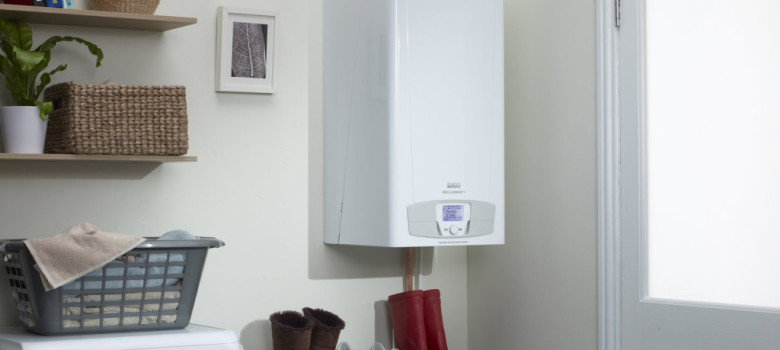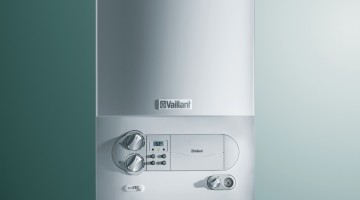
Gas boilers are central heating systems that act like mini fires, continuously heating water. This heated water is then pumped around the property through pipes and radiators in order to heat space, and either pumped directly to taps and showers (as with a combi boiler), or stored in a hot water tank for future water usage. The boiler uses either on-grid gas or bulk LPG stored on site. This gas is then burned in the boiler’s combustion chamber and warms the water to around 70°C through a heat exchanger.
Are gas boilers dangerous?
Importantly, when natural gas is burned without enough oxygen it burns yellow. This creates a dangerous toxic gas called carbon monoxide, which can be lethal if inhaled for long periods. You shouldn’t have any problems, provided you have a carbon monoxide detector and have your boiler serviced regularly.
Are there different types of boiler available?
There are four main types of gas boiler that are installed up and down the UK:
Combination, or combi boilers do not use a water tank to store the hot water but produce instant hot water direct from the boiler for taps and showers.
System boilers store hot water in an insulated water tank and have one cold water tank.
Regular boilers in essence work in much the same way as system boilers, but can be vented (one cold water tank) or unvented (two cold water tanks).
Combined heat and power (CHP) boilers act as micro power plants by providing your hot water like the previous three, but also generating electricity to use around the home.
>>> The cost of heating your home with gas vs electricity <<<
Are gas boilers efficient?
We recommend replacing your boiler every 12 years or so: this is to compensate for both the loss of efficiency and the lack of available spare parts for repair. If your boiler is pre-2002 the chances are that it is a non-condensing model, which are up to 80% efficient, with new condensing models reaching into the 90s%.
Boiler controls
Gas boilers can be programmed to come on at specific times of the day, to ensure that you never heat your home pointlessly when no one is in. Also, to avoid overheating or under-heating your property, thermostats can be installed to make sure that the required temperature is reached and maintained. For larger properties with rooms that are often uninhabited, thermostatic radiator valves may be installed on each radiator to minimise wasted heat.
Installing a new boiler
Are you thinking about getting a new boiler? We have scoured the country for the best tradespeople, so that we can make sure we only recommend those we really trust.
If you would like us to find you a local installer to install a new boiler in your home, just fill in the form below and we will be in touch shortly!












am looking for a boiler manufacturing company that can partner with us to supply and install a new steam boiler to a refining and petrochemical company in Nigeria
must you have a 22mm pipe for a combi boiler or can it run off a15 mmpipe
If you are installing a new boiler, building regs stipulate you need a 22mm pipe.
The pipework should be sized appropriately. If it is gas it should be of sufficient size to deliver a gas pressure of not more that 1mbar drop between the meter outlet and the appliance so depending on the gas rate of the boiler and distance from the boiler that size could be 15mm, 22mm, 28mm even larger depending on the calculation.
If it is pipework for the delivery of water to to the heat emitters and/or DHW cylinder, then it should be sized to preferably have a flow velocity of of around 1M/sec and the available head of the pump should also be used to calculate pipe size in order not to exceed the maximum available head/duty.
I have been advised that my boiler needs replacing. It is a traditional system with a cold water tank.To use a combo boiler is difficult as I cannot find a location where access to the outside of my house is available. Are traditional boilers now illegal and if so how do I resolve this problem.My current boiler vents through a lined chimney. I live in a detached bungalow with bedrooms in the roof area.
Hello David
Traditional boilers aren’t illegal although if what you mean by ‘traditional’ is not a Combi or System boiler. A traditional boiler nowadays normally refers to a boiler only that doesn’t contain any DHW capability, pump or expansion vessel as these will all be sited outside the boiler. When replacing conventional boilers, it may be necessary to replace the DHW cylinder as these need to meet minimum standards of energy efficiency both in terms of insulation and the heat transfer between the boiler and the Domestic Hot Water.
Hi David, Heat only boilers are not illegal – in fact a huge number of these boilers are still being installed up and down the country – and they are as efficient as any new combi boilers. The issue is to do with the flue – you wouldn’t be able to install a new boiler and keep your existing set up. You are going to need to find an external wall somewhere on which you can install the new boiler i’m afraid!
I am trying to replace my defunct Ideal conventional boiler with another conventional boiler. Government regs. do not make condensing boilers(combi or regular) mandatory,yet firms approached, refuse any alternative. Is this peculiar to Scotland,or are there any reputable companies that will fit a conventional boiler?
FAO David Drayton
Hello David, there is an option that would allow you to use your chimney to flue your boiler. Viessmann have a chimney flue kit for use with their Vitodens range of boilers. This puts a flue liner down your chimney specifically for the boiler.
Could you recommend a small boiler for just water and cooker please
Hi Chris, a combi boiler would work well for this – it would create hot water on demand. Ideally opt for a Worcester bosch or Vaillant as they are the best brand.
I need to replace my boiler and I qualify for Boiler Assistance but my flat does not because the pipework is encased in concrete flooring so I CAN’T HAVE A COMBI BOILER. The reason being that BG will not use a pressurised system with buried piping. I am considering using a new Regular Boiler on the existing system but I cannot find any information about assistance for this type of boiler. I am in my 70’s. Has anyone had a similar experience?
I am looking to get a new gas boiler. Ours is currently in a cupboard in our kitchen, but we are looking to move it into a new utility we have built on the property. I was wondering what kind of cost this would be? We currently have a combi boiler, but I am interested in getting a megaflow. Would this be expensive to make the change.
Hi Phil, it is an interesting question. The move to a megaflo cyclinder with your boiler (which is an unvented pressurised hot water / heating system) is unfortunately not going to be cheap. The pressurised may (and should!) give better water pressure than a combi – although this depends on the kW output of the combi boiler – Basically both operate at mains pressure, but a unvented system stores hot water and this is sent around the house at mains water pressure. A combi boiler is fed water at mains pressure, but normally can’t create the hot water at a sufficient rate to keep the pressure this high. You are looking at about £1000+ for the Megaflo, although you might want to look at a cheaper Joule pressurised cylinder (I have this at home and it works great). You will also need to get a new boiler – you won’t be able to recycle the combi boiler. I suggest looking at Vaillant, Worcester Bosch or Baxi as boiler manufacturers. Here you are looking at anything from about £900. Then it depends on location of the current boiler and where you want to move it to, as well as the existing pipe work, the incoming gas supply and so forth. You could easily spend in excess of £5k moving the boiler, so think carefully before doing it!!
Do you know how long the pipe from the gas supply to the boiler can be? I’m looking to put a boiler in my extension which means running the pipe a hundred feet or so from the supply. Is this ok?
With regards extensions, can you discuss the pros and cons of putting a boiler outside? I have seen some people with boilers in their outhouses and things, but can that cause problems?
Running a gas pipe 100ft is easily achievable, the pipe just has to be sized appropriately to so that you don’t have a pressure drop of more than 1mbar between the outlet of the meter and the appliance when running at maximum burner output. Your Gas Safe installer can work this out for you. Nowadays most boilers have inbuilt frost stats to protect them but this doesn’t protect the pipework. For this you would need to use the appropriate good quality insulation and trace heating where above ground and underground insulated pipework can also be used for the longer runs where you may not be able to easily locate the pipework above ground. Alternatively, you could introduce an appropriate antifreeze to the system. I definitely wouldn’t recommend using a combination boiler for this application as the excessive draw off length for the hot water would be wasteful in terms of both water and energy.
I must thank you for the efforts you have put in penning this website.
I really hope to see the same high-grade blog posts by
you later on as well.
My existing gas boiler is about 40 years old. Would a combi boiler provide a far better environmental solution than a conventional/system boiler? I would prefer the latter as I assume that adjusting the existing pipework in connection with installing a new conventional boiler would involve far less work. Also, my hot water cylinder is in a cupboard/duct with very little working space. Also, could any work required to existing radiators differ greatly?